(单词翻译:单击)
In just a few short years, The Beatles created the most iconic albums of all time, changing music and pop culture forever. And while they recorded their greatest hits, the four lads from Liverpool were living out some of rock and roll's craziest stories. From their first American tour to their troubled last days, The Beatles were constantly cooking up the strangest plans, meeting the most interesting people, and winding up in the weirdest places.
在短短几年时间里,甲壳虫创造了有史以来最具标志性的歌曲专辑,为音乐和流行文化带来了永久的变化。在他们录制风靡一时的金曲的过程中,这四个来自利物浦的青年制造了摇滚乐疯狂的故事。从首次美国之旅,到最后烦不胜烦的日子,甲壳虫乐此不疲:制定稀奇古怪的计划,会见趣味无穷的人,以及住在偏僻怪异的地方。
10.The Jelly Bean Incident
10.果冻豆事件
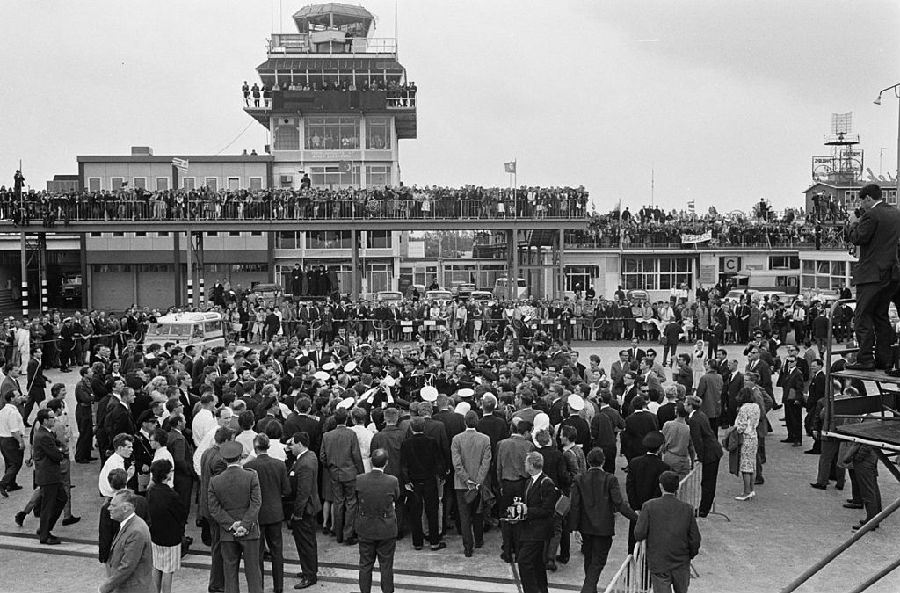
When The Beatles arrived in America in 1964, they sparked a wild tide of mass hysteria that we all know as Beatlemania. Over 75 million people tuned in to watch their performance on The Ed Sullivan Show, and when they showed up in Washington, D.C., they had to rent the entire seventh floor of the Shoreham Hotel to escape their frenzied fans.
1964年甲壳虫到达美国后,引起了一股狂潮,后来称为"甲壳虫狂热"。超过7500万人观看了他们的表演《埃德·沙利文秀》。当在华盛顿特区出现时,他们不得不把肖雷汉姆酒店整个第七层全部租下来,否则躲不开狂热的粉丝。
During their 34-day tour, the band played at Carnegie Hall and San Francisco's Cow Palace, but perhaps their most painful performance was at the Coliseum in D.C. A boxing arena, the stage was set in the middle of the auditorium, meaning the boys were surrounded. Throughout the gig, they had to turn around continually so everyone could glimpse their faces. That meant Ringo had to get up between songs and drag his kit around by himself.
在他们34天的旅途中,乐队在卡内基音乐厅和旧金山公牛体育馆等地方演出,但让他们最难受的演出也许是在特区竞技场那一次。舞台是一个拳击比赛场,设在观众席中央,以便乐队处在乐迷中央。在整个特约演出过程中,他们不得不一直四方转动,否则另外三个方向的观众看不见他们的脸。这就意味着,林戈必须在换曲间隙立即起身,自己抓起放在身边的道具。
Then fans brought out the jelly beans. Before their performance, The Beatles had been interviewed by the New York Times, and George made a comment about how much he liked "jelly babies." Eager to please, starstruck fans loaded their pockets with jelly beans and hurled them at the stage, hitting the band from every side. The candies hit their guitar strings, pinged against Ringo's cymbals, and smacked the performers in the face.There'd been a major misunderstanding. Jelly beans aren't jelly babies. Babies are soft (the US equivalent would be gummi bears), while beans are pretty hard. George was worried he might go blind. "It's a bit dangerous, you know," he once said, "because if a jelly bean, traveling about 50 miles an hour through the air, hits you in the eye, you're finished." Fortunately, the boys made it through, battered but alive, and went on to play another day.One of the few men in the audience that evening was future vice president Al Gore. He claims that he didn't throw any jelly beans.
乐迷带来了果冻豆。表演开始前,甲壳虫接受了《纽约时报》的采访,乔治说了说他喜欢"果冻宝宝"这种甜食的程度。满怀热情的追星族把口袋装满了果冻豆,还撒向了舞台,从四面八方投向乐队。糖豆落在吉他琴弦上,打在林戈的钹上,飞到表演者的脸上。一个巨大的误会产生了。果冻豆不是"果冻宝宝"。果冻宝宝很软,而糖豆相当硬。乔治很担心自己会瞎掉。"有点儿危险,你知道,"他曾经说,"因为糖豆在空气中的速度是每小时50英里,击中眼部,你就完蛋了。"幸运的是,乐队成员熬了过来,虽被击中,但是都好好儿的,几天后继续演出。当晚观众中有一人后来成为了美国副总统——阿尔·戈尔。他声称没扔过一粒糖豆。
9.Jimmie Nicol's 10-Day Drumming Gig
9.特邀吉米·尼克尔打鼓10天
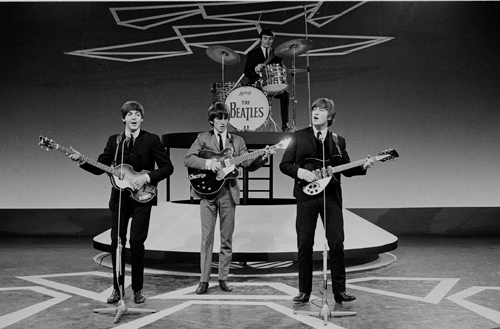
Beatles fans love to debate the identity of the "Fifth Beatle," that unofficial member who helped push the band to greatness. Some say it's original drummer Pete Best. Others point to Stuart Sutcliffe, the first Beatles' bassist. Still other contenders for the title are manager Brian Epstein, producer George Martin, and "Let It Be" pianist Billy Preston. But perhaps the best candidate for fifth Beatle is Jimmie Nicol, the man who replaced Ringo.
甲壳虫粉丝喜欢争辩谁是"第五位甲壳虫"——乐队非正式成员,但对乐队的辉煌贡献了力量。有人认为他应该是最初的鼓手彼得·贝斯特。其他人则认为应该是斯图尔特·萨克利夫,甲壳虫第一位贝斯手。当然还有其他候选人:经理布莱恩·厄普斯顿、制作人乔治·马丁和唱片《随它去》的钢琴手比利·普雷斯顿。尽管如此,也许最佳候选人要数吉米·尼克尔,他替代了林戈。
Nicol was a 24-year-old drummer and the head of his own band, The Shubdubs. But one day in June 1964, he got a call from Brian Epstein. Ringo was sick with tonsillitis, and the band was about to go on tour. Epstein couldn't cancel, so he was wondering if Jimmie was interested in filling Starr's shoes.Jimmie jumped at the chance, but there were a few snags. George opposed the plan—and Ringo's pants were too short for the new drummer. But a couple of arguments, one audition, and a moptop haircut later, Nicol was touring with the world's most famous band. They performed in Australia, Holland, Denmark, and Hong Kong. Everywhere Nicol went, he was mobbed by screaming girls. True, when he was on his own, no one recognized him. But with John, Paul, and George by his side, Nicol was a superstar.As for poor Ringo, he was back in England, sitting in a hospital bed, feeling down in the dumps. "They'd taken Jimmie Nicol, and I thought they didn't love me anymore," he said. Then Paul sent Ringo a "get well" card, and 10 days later, Richard Starkey was feeling better and ready to rock. On his final night on tour, Jimmie was given a £500 bonus and a gold watch. Then he caught a plane back to England, and his glory days were done.Nicol's post-Beatles career was less than impressive. His band, The Shubdubs, didn't do very well, and by 1965, he was bankrupt. He quit the music scene in '67, and in recent years, he's vanished from the face of the Earth. He's supposedly living in London, but Nicol's own son isn't sure if he's alive or not. But Nicol's influence has outlasted his reputation. Back on his 10-day tour, the guys would occasionally ask Jimmie how he was getting along. His stock answer was, "It's getting better." Inspired, Paul and John took his catchphrase and turned it into their Sgt. Pepper song "Getting Better."
尼克尔,一位24岁的鼓手,组建了自己的乐队。但在1964年6月的一天,他接到布莱恩·厄普斯顿的电话。林戈感染了扁桃体炎,而乐队即将开始巡演。厄普斯顿无法取消,所以问问吉米是否乐意接替斯塔尔的职位。吉米抓住了这个机会,期间也遇到几个麻烦。乔治反对这项计划——林戈的裤子吉米穿起来太短。但是经过几番争论、一次试演、改换拖把头之后,尼克尔与世界最著名的乐队开始巡演。他们在澳大利亚、荷兰、丹麦和香港演出。尼克尔每到一个地方,都会被一群尖叫的女孩儿团团围住。而一个人单独外出,他完全不会被认出来。只要约翰、保罗和乔治在他旁边,尼克尔就是超级明星。可怜的林戈在英国大后方,坐在病床上,黯然神伤。"他们带吉米·尼克尔去了,我想他们不再爱我。"他这样说。保罗给林戈寄过一张祝他"早日康复"的卡片,10天之后,理查德·斯塔基感觉好了,准备重回乐队。在巡演最后一天晚上,吉米收到500英镑津贴和一只金表。随后他乘飞机回到英格兰,他的光荣岁月暂告一段落。尼克尔离开甲壳虫后的事业不再惊心动魄。他的乐队表现不是很好,1965年他破产了。1967年,他离开了乐坛;随后几年,他从地球上消失了。据说他住在伦敦,但是尼克尔的儿子不能确定他是否还活着。虽然这样,尼克尔的影响力比他的名声持续得更久。在那10天巡演期间,队友偶尔会问吉米感觉如何。他的答案吓人一跳:"越来越好了。"保罗和约翰受到启发,用他精辟的话创作了专辑《胡椒军士》里的歌曲"越来越好"。
8.The Great Beatles Relay Race
8.大甲壳虫接力赛
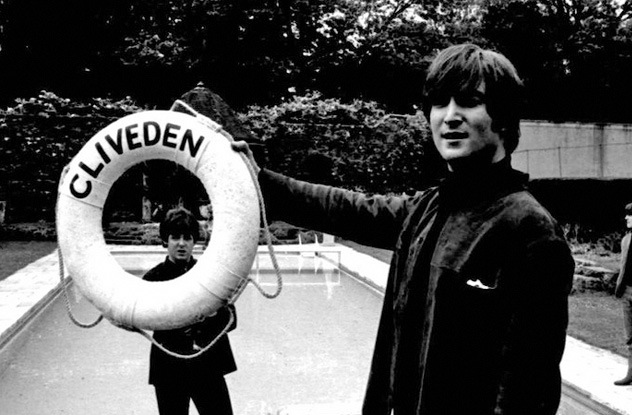
The Beatles knew a thing or two about music, but even the biggest Beatlemaniac will admit the Fab Four weren't all that athletic. According to biographer Bob Spitz, there was a time when The Beatles smoked hundreds of cigarettes a day. While it didn't seem to affect their voices, all that tar and nicotine took their toll on their health. George Harrison even admitted that all those cigs contributed to his fatal lung cancer.
甲壳虫乐队成员懂音乐,而即使是最痴迷的甲迷也承认他们并不都擅长运动。据传记作家鲍勃·斯匹茨所言,有段时间甲壳虫一天烧掉几百支烟。尽管他们的嗓子似乎不受影响,这些焦油和尼古丁却破坏了他们的健康。乔治·哈里森甚至承认是这些烟导致他患上致命的肺癌的。
Regardless of their personal habits, The Beatles were eager to show off their sporting skills on the set of their 1965 film Help! It was the boys' last day on set, filming at Cliveden House, a 19th-century mansion in Maidenhead, Berkshire. When the four weren't filming, they were goofing off and playing softball, until someone on the crew challenged them to a relay race.The setup was simple. There were four teams, each one made of six men. The teams were divided into four groups: electricians, carpenters, the camera crew, and the Fab Four. Rounding out The Beatles' team were their road manager and their chauffeur, and when somebody shouted "go," the sprinters took off, tearing their way around the Cliveden House and through the garden. According to Paul, the runners covered at least a mile, and believe it or not, The Beatles won. And thanks to a visiting American DJ who brought along a camera, you can see some of the race for yourself on the Help! DVD.
除了个人习惯,甲壳虫渴望在他们1965年拍摄的影片《救命!》中展现他们的运动技能。最后一天,他们在克莱夫登庄园拍摄——这是伯克郡梅登黑德一座19世纪的别墅。当他们四人不用拍摄时,他们会玩垒球消磨时间,除非摄制组有人向他们挑战接力赛。分组很简单。共4队,每队6人。小队被分为4组:电工、木匠、摄影和甲壳虫。甲壳虫队另两名队员是他们的巡演规划人和私人司机。听到有人喊"跑",短跑健将们一跃而出,沿着克莱夫登庄园和花园跑去。据保罗所说,参赛者至少要跑一英里,无论你相不相信,甲壳虫队总会赢。多谢一位带着相机到访的美国音乐节目主持人,你可以自己看看《救命!》DVD里面的比赛片段。
7.When The Beatles Met Elvis
7.当甲壳虫遇到猫王
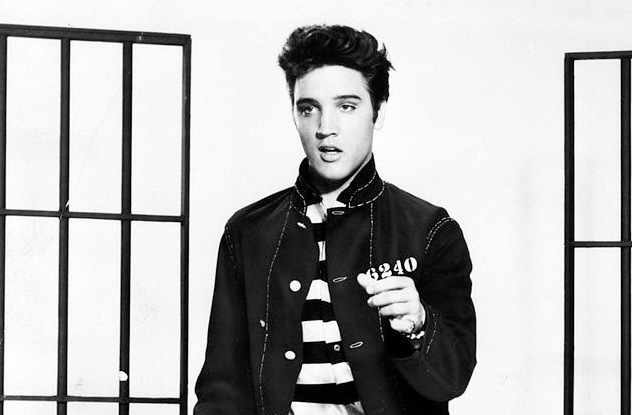
As big-time celebrities, The Beatles got to meet quite a few famous people. In 1964, they posed for photos with soon-to-be-champion Cassius Clay, who eventually changed his name to Muhammad Ali. That same year, Bob Dylan introduced the boys to marijuana, one of the more iconic events in Beatles lore. But perhaps the most interesting meet-up took place in 1965, when The Beatles visited the King of Rock and Roll himself, Elvis Presley.
作为一等一的名人,甲壳虫能够见到众多著名人士。1964年,他们与随即将夺冠的卡修斯·克莱合影,卡修斯最终改名换姓,即穆罕默德·阿里。同年,鲍勃·迪伦介绍甲壳虫认识了大麻,这是甲壳虫乐队的标志性事件之一。但是,或许最有意思的会面发生在1965年——甲壳虫拜访摇滚乐之父,猫王埃尔维斯·普雷斯利。
This was a pretty big deal for John Lennon. As a boy, John had been an Elvis groupie, complete with Presley hair, long sideburns, and a poster of the King on his bedroom wall. He even once said that if it wasn't for Elvis, "I wouldn't be here." The first time the two legends interacted was right after The Beatles' performance on "The Ed Sullivan Show." The King sent a congratulatory telegram, but the rockers didn't actually meet until the Beatles' second American tour.The party was held at Elvis's Bel Air mansion, and unfortunately for fans, cameras and microphones weren't allowed inside. When The Beatles finally showed up for the big meet, things began awkwardly. The Brits weren't sure what to say, and John started the conversation with a half-kidding insult, asking Elvis why he was making so many stupid movies instead of recording new material. "What happened to good old rock and roll?" he asked. Presley wasn't too offended and even managed to ease the tension when he said, "If you guys are just going to sit around and stare at me, I'm going to bed." With the ice broken, everyone loosened up and had a better time. John and Elvis talked about Dr. Strangelove, while George smoked weed with one of the Memphis Mafia. Elvis's manager, Colonel Parker, operated a craps table and a roulette wheel, and the King played pool with Ringo. Elvis eventually whipped out a few guitars for an impromptu jam session.Four hours later, the meeting was over. The Beatles returned to their apartments, and they never met Elvis again. Elvis eventually turned his back on the band. In 1971, he requested a meeting with J. Edgar Hoover, claiming that he wanted to work as an FBI informant and rat out subversives in the entertainment industry. At the top of his hit list were The Beatles, who'd "laid the groundwork for many of the problems we are having with young people by their filthy, unkempt appearance and suggestive music." The head of the FBI declined Elvis's assistance.
这是约翰·列侬的大事。小时候,约翰就是猫王的追星族,留着猫王那样的发型和长长的鬓角,在自己的房间里贴满了猫王的画报。他曾经甚至说,要不是因为猫王,"我根本不会待在这儿。"这两个传奇故事的第一个交集刚好是在甲壳虫表演完"埃德·萨利文秀"之后。猫王发来一份贺电,他们实际上并没见面,直到甲壳虫第二次到美国巡演。聚会在猫王的贝莱尔别墅进行,可惜里面不允许使用相机或者话筒。甲壳虫终于在这个盛大的聚会上露面,但问题也随之出现。这群英国人不知道说什么,约翰半开玩笑半冒犯地开了头,他问猫王为什么拍了这么多愚蠢的电影而没有录新唱片。"优秀的老摇滚乐手怎么了?"他问到。普雷斯利没有感到太唐突,甚至缓和了紧张的气氛,他说到,"如果你们几个就只是四处坐下来盯着我,那我就去睡了。"打破了僵硬的场面,大家都放松了,过得很愉快。约翰和艾维斯谈了谈电影《奇爱博士》,而乔治与一个孟菲斯黑手党在一旁抽烟。埃尔维斯的经纪人,帕克上校,组织了一桌双骰赌和一个轮盘赌,猫王与林戈玩儿台球。埃尔维斯最后拿出了几把吉他,要进行即兴演奏。4个小时后,聚会结束。甲壳虫回到他们的公寓,再也没有与埃尔维斯见过面。埃尔维斯最终背弃了甲壳虫。1971年,他要求与小埃德加·胡佛见面,声称他想成为一名FBI情报员,揭发娱乐圈的间谍活动。排在其黑名单首位的就是甲壳虫——他们"利用肮脏、蓬乱的外表和音乐暗示,为我们与青年之间的障碍提供了基础"。FBI的头儿拒绝了埃尔维斯的帮助。
6.Back In The USSR
6.在苏联的日子
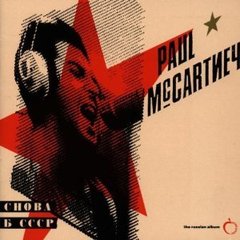
In 1966, after John made his infamous "more popular than Jesus" quip, angry Americans rampaged, bashing and burning piles of Beatles albums. And conspiracy theories abound, lambasting the boys from Liverpool for connections with the Illuminati.
1966年,约翰说了一句遭到人们厌恶的俏皮话"比耶稣还受欢迎",美国人暴跳如雷,指责甲壳虫,并一叠一叠地烧掉他们的唱片。阴谋论无处不在,斥责从利物浦来的男孩儿们竟然与先知们有联系。
However, nobody feared The Beatles more than the Soviet government. Recognizing their rebellious attitudes and Western ways as a threat, the USSR banned the sale of Beatles albums and punished anyone caught listening to this "capitalist pollution." This only created a black market for contraband albums. Like many illegal items, Beatles records were smuggled into Russia by sailors, actors, and the occasional Party official. The albums were then sold for a hefty price. Vinyl discs could cost Soviet citizens up to two weeks of their hard-earned paychecks. Some enterprising outlaws devised an ingenious solution: etch the music onto X-ray film with the help of a modified record player. These jerry-rigged disks were covered in images of fractured arms and cracked pelvises, causing fans to refer to the albums as "music on the bones" or "records on ribs."Other musicians received the X-ray treatment, but there was something special about The Beatles. According to Mikhail Safonov of the Institute of Russian History, "Beatlemania washed away the foundations of Soviet society. The Beatles brought us the idea of democracy." Inspired by the Fab Four's fashion sense, teens used army boots and hand-me-down coats to copy the Beatles' signature collarless look. Men grew their hair long, kids started their own rock bands, and anyone who challenged The Beatles was viewed with disdain—even government officials.The state fought back as hard as it could. Students caught listening to The Beatles could be expelled from college. One Russian school put the band on trial and broadcasted the little drama for all the USSR to hear. And anyone sporting a moptop could be nabbed by the police and given a quick haircut. But despite all these efforts, The Beatles remained. The USSR collapsed, and Paul McCartney played his first performance in Moscow in 2003.
尽管如此,没有人比苏联政府更加害怕甲壳虫。意识到他们的反叛态度和西式风格的威胁,苏联禁止销售甲壳虫专辑,并惩罚任何听这些"资本主义毒物"的人。这就诞生了一个交易违禁专辑的黑市。与其他非法物品一样,甲壳虫的唱片通过水手、演员和某些党政官员的行为走私进入俄国,随后以高价卖出。买一张黑胶碟要花掉苏联市民多达两周的辛苦钱。有些野心勃勃的不法之徒想出了一个精明的办法:用改良后的留声机把音乐刻在X光胶片上。这些应急用的唱片藏在画有断裂的手臂和盆骨的图画下,歌迷后来就用"骨头上的音乐"或者"肋骨上的唱片"指代这些专辑。其他音乐家也有X光的待遇,但是甲壳虫的有些特别。据俄罗斯历史研究所的米哈伊尔·萨福诺夫所说,"甲壳虫狂热冲垮了苏联社会的基础。甲壳虫给我们带来了民主思想。"受到这四人流行风格的启发,青少年用军靴和旧外衣模仿甲壳虫没有衣领的典型装束。男人留了长发,孩子们组建了自己的摇滚乐队,任何挑战甲壳虫的人都会遭到唾弃——即使是政府官员。整个国家全力回击。学生听甲壳虫可能被赶出学校。一所学校起诉了乐队,并把这段小插曲广播给所有苏联人。任何炫耀甲壳虫发型的人都可能被警察逮捕,立即强制理发。可尽管如此,甲壳虫仍然存在。苏联解体了,2003年保罗·麦卡特尼在莫斯科进行了首场演出。
翻译:罗惠月 来源:前十网


